August 1951 Information is filtering back about secret meetings being held in the forests outside Nairobi. A secret society called the Mau Mau, believed to have been started in the previous year, requires its members to take an oath to drive the white man from Kenya. Intelligence suggests that membership of the Mau Mau is currently restricted to members of the Kikuyu tribe, many of whom have been arrested during burglaries in Nairobi's white suburbs.
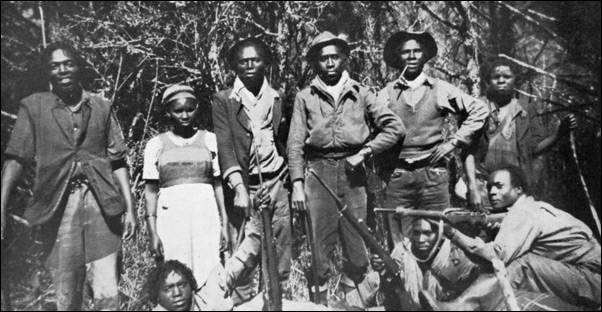
24 August 1952 The Kenyan government imposes a curfew in three districts on the outskirts of Nairobi where gangs of arsonists, believed to be members of the Mau Mau, have been setting fire to homes of Africans who refuse to take the Mau Mau oath.
Although there is little mention in the literature of the actual oath, it is known that the ceremony began with the new members taking a vow to honor the old religion of their tribal ancestors. Once past that stage, it is impossible to know how much of the oath is real and how much is British propaganda. The colonial secretary, Oliver Lyttelton, wrote in part:
The Mau Mau oath is the most bestial, filthy and nauseating incantation which perverted minds can ever have brewed. I have never felt the forces of evil to be so near and as strong as in Mau Mau. As I wrote memoranda or instruction, I would suddenly see a shadow fall across the page – the horned shadow of the Devil himself.
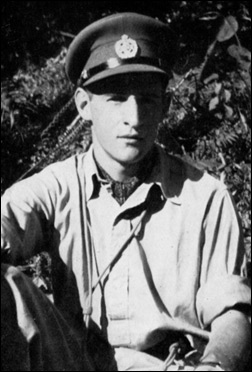
Major Frank Kitson (later General)
In Gangs and Counter-gangs, Barrie and Rockliff, London, 1960, Major Frank Kitson mentions a Mau Mau raid where body parts of an old African were taken to be used in the oathing ceremony later:
The gang, frenzied by the thought of blood, slashed around with their simis (a Kikuyu sword) and fired their guns. One old man, slower than the rest, was caught and hamstrung. He fell at the feet of his pursuers, covering his face with his arms to protect it from the slicing swords, but a mouse in a mechanical mincing machine would have had a better chance of survival. One terrorist hacked off a foot, and another sliced off his testicles to use later in an Oathing ceremony. A third gouged out his eyes with a staple and put them in his pocket for the same purpose. When they had finished, most of the gang came by to cut and stab the twitching corpse. They then licked the blood off their simis and moved off into the night, having first set fire to all the huts they could see.
7 October 1952 Senior Chief Waruhui is assassinated in Kenya -- he is speared to death in broad daylight on a main road on the outskirts of Nairobi. He had recently spoken out against increasing Mau Mau aggression against colonial rule.
19 October 1952 The British government announces that it is to send troops to Kenya to help the fight against the Mau Mau.

21 October 1952 With the imminent arrival of British troops, the Kenyan government declares a state of emergency following a month of increasing hostility. Over 40 people have been murdered in Nairobi in the last four weeks and the Mau Mau, officially declared terrorists, have acquired firearms to use along with the more traditional pangas. As part of the overall clamp down Jomo Kenyatta, president of the Kenya African Union, is arrested for alleged Mau Mau involvement.

30 October 1952 British troops are involved in the arrest of over 500 suspected Mau Mau activists.

14 November1952 Thirty-four schools in Kikuyu tribal areas are closed in the continuing clamp down on Mau Mau activists.
18 November 1952 Jomo Kenyatta, president of the Kenya African Union and the country's leading nationalist leader is charged with managing the Mau Mau terrorist society in Kenya. He is flown to a remote district station, Kapenguria, which reportedly has no telephone or rail communications with the rest of Kenya, and is being held there incommunicado.
25 November 1952 The Mau Mau has declared open rebellion against British rule in Kenya. British forces respond by arresting over 2000 Kikuyu suspected of Mau Mau membership.

18 January 1953 Governor-general Sir Evelyn Baring imposes the death penalty for anyone who administers the Mau Mau oath - the oath is often forced upon Kikuyu tribesmen at the point of a knife, and calls for the individual's death if he fails to kill a European farmer when ordered.
26 January 1953 Panic has spread through Europeans in Kenya after the slaying of a white settler farmer and his family. Settler groups, displeased with the government's response to the increasing Mau Mau threat have created their own Commando Units to deal with the treat. Sir Evelyn Baring, the Governor-general of Kenya has announced that a new offensive is to begin under the command of Major-general William Hinde. Amongst those speaking out against the Mau Mau threat and the government's inaction is Elspeth Huxley, author (who wrote The Flame Trees of Thika in 1959), who in a recent newspaper article compares Jomo Kenyatta to Hitler.
1 April 1953 British troops kill twenty-four Mau Mau suspects and capture an additional thirty-six during deployments in the Kenyan highlands.
8 April 1953 Jomo Kenyatta, known to his followers as Burning the Spear, is sentenced to seven years hard labour along with five other Kikuyu currently detained at Kapenguria.
17 April 1953 An additional 1000 Mau Mau suspects have been arrested over the past week around the capital Nairobi.
3 May 1953 Nineteen Kikuyu members of the Home Guard are murdered by the Mau Mau.
29 May 1953 Kikuyu tribal lands are to be cordoned off from the rest of Kenya to restrict movement of potential Mau Mau terrorists.
July 1953 Another 100 Mau Mau suspects have been killed during British patrols in Kikuyu tribal lands.
15 January 1954 General China, the second in command of the Mau Mau's military efforts is wounded and captured by British troops.
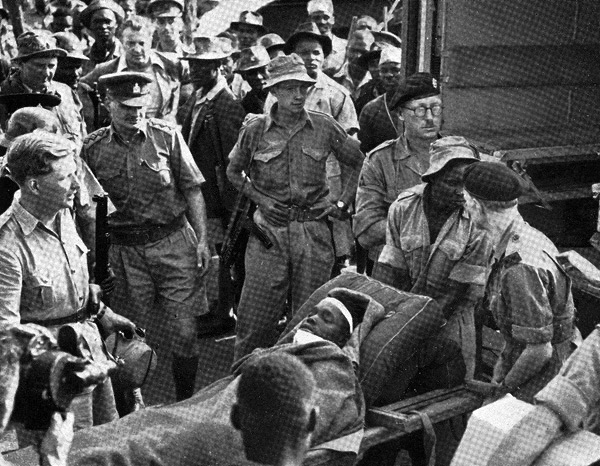
9 March 1954 Two more Mau Mau leaders have been secured: General Katanga is captured and General Tanganyika surrenders to British authority.
March 1954 The great British plan to end the Mau Mau Rebellion in Kenya is presented to the country's legislature -- General China, captured in January, is to write to the other terrorist leaders suggesting that nothing further can be gained from the conflict and that they should surrender themselves to British troops waiting in the Aberdare foothills.
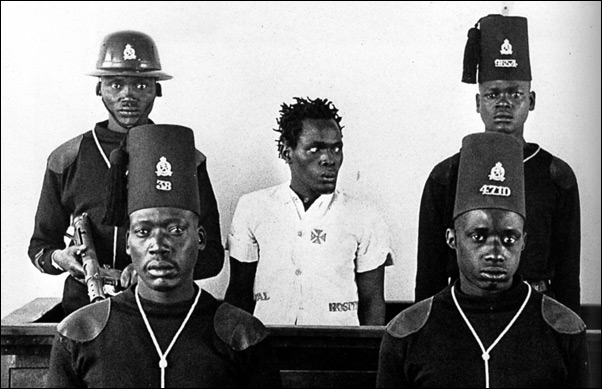
11 April 1954 British authorities in Kenya admit that the 'General China operation' revealed previously to the Kenyan legislature has failed.
24 April 1954 Over 40,000 Kikuyu tribesmen are arrested by British forces, including 5000 Imperial troops and 1000 Policemen, during a widespread, coordinated dawn raids.
26 May 1954 The Treetops Hotel, where Princess Elizabeth and her husband were staying when they heard of King George VI's death and her succession to the throne of England, is burnt down by Mau Mau activists.
18 January 1955 The Governor-general of Kenya, Sir Evelyn Baring, offers an amnesty to Mau Mau activists -- the offer means that they will not face the death penalty, but may still be imprisoned for their crimes. European settlers are up in arms at the leniency of the offer.
21 April 1955 Unmoved by Kenya's Governor-general's, Sir Evelyn Baring, offer of amnesty the Mau Mau killings continue -- today two English schoolboys are murdered.
10 June 1955 Britain withdraws the offer of amnesty to the Mau Mau.
24 June 1955 With the amnesty withdrawn, British authorities in Kenya can proceed with the death sentence for nine Mau Mau activists implicated in the death of two English schoolboys.
October 1955 Official reports suggest that over 70,000 Kikuyu tribesmen suspected of Mau Mau membership have been imprisoned, whilst over 13,000 people have been killed (by British troops and Mau Mau activists) over the last three years of the Mau Mau Rebellion.
7 January 1956 The official death toll for Mau Mau activists killed by British forces in Kenya since 1952 is put at 10,173.
5 February 1956 Nine Mau Mau activists escape from Mageta island prison camp in Lake Victoria.
July 1959 The deaths of 11 Mau Mau activists held at Hola Camp in Kenya is cited as part of the British opposition attacks on the UK government over its role in Africa.
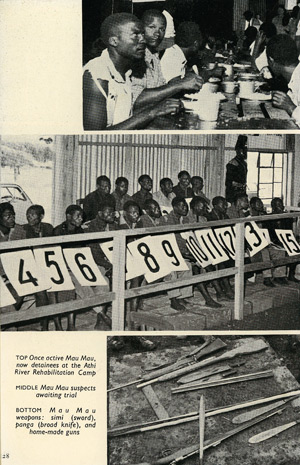
10 November 1959 The state of emergency is ended in Kenya.
18 January 1960 The Kenyan Constitutional Conference being held in London is boycotted by African nationalist leaders.
18 April 1961 In return for the release of Jomo Kenyatta, African nationalist leaders agree to take a role in Kenya's government.
14 July 1961 Jomo Kenyatta, now aged 71, is finally released from house arrest in Gatundu, 22 kilometres outside Nairobi.
21 August 1961 All restrictions on Jomo Kenyatta's movements are lifted following his release from prison last month.
27 May 1963 Jomo Kenyatta is elected prime minister in Kenya's first multi-racial elections.
12 December 1963 Kenya becomes the 34th African state to achieve independence.
16 December 1963 General amnesty is announced for Mau Mau activists.
12 December 1964 Kenya is declared a republic. Jomo Kenyatta is to be its first president.
1 September 2003 After more than 50 years the Mau Mau, who fought for independence in Kenya, is finally unbanned.